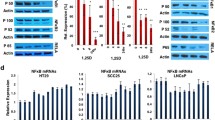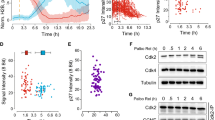Abstract
The present study was addressed to understand the interrelationship between Receptor-Ck induction-activation coupling; isoprenoids (derived from mevalonate pathway) and cyclin-dependent kinase inhibitors. The results reported here unambiguously reveal that isoprenoids regulate the expression of genes coding for CDK inhibited p16 and p27. Further, Receptor-Ck dependent signalling, known to control the mevalonate pathway, had a direct effect upon the p27 gene expression. Based upon these studies coupled with our earlier findings we propose that Receptor-Ck has an important role in the regulation of cell cycle machinery.
Similar content being viewed by others
References
Hirama T, Koeffler PH: Role of cyclin-dependent kinase inhibitors in the development of cancer. Blood 86: 841–854, 1995
Bruce S: Cell cycle control of DNA replication. Science 274: 1659–1663, 1996
Barbu V, Dautry F: Mevalonate deprivation alters the induction of fos and myc by growth factors. Oncogene 5: 1077–1080, 1990
Siperstein MD: Role of cholesterogenesis and isoprenoid synthesis in DNA replication and cell growth. J Lipid Res 25: 1462–1468, 1994
Peeper DS, Upton TM, Ladha MH, Neuman E, Zalvide J, Bernards R, DeCaprio JA, Ewen ME: Ras signalling linked to the cell cycle machinery by the retinoblastoma protein. Nature 386: 177–181, 1997
Linnete GP, Li Y, Roth K, Korsmeyer SJ: Cross talk between cell death and cell cycle progression: Bcl-2 regulates NFAT-mediated activation. Proc Natl Acad Sci USA 93: 9545–9552, 1996
Kaul D, Varma N: Molecular mechanism involved in TPA-induced myelopoietic programming. Leukemia Res (in press)
Kaur M, Kaul D, Sobti RC: Receptor-Ck dependent regulation of genes involved in the cell cycle. Mol Cell Biochem 181: 137–142, 1998
Kaul D: Receptor-Ck and leukemogenesis. Leukemia Res 22: 389–394, 1998
Kaul D, Singh J: Does Receptor-Ck deficiency initiate leukemia? Cancer Lett 112: 199–202, 1997
Kaul D, Kaur M: LDL-dependent regulation of Bcl-2 and cyclin ‘D’ gene expression in lymphocytes from normal and CML patients. Cancer Lett 119: 131–135, 1997
Vitols S, Gahrton G, Ost A, Peterson C: Elevated low density lipoprotein receptor activity in leukemic cells with monocytic differentiation. Blood 63: 1186–1193, 1984
Khleif SN, DeGregori J, Yee CL, Otterson GA, Kaye FJ, Nevins JR, Howley PM: Inhibition of cyclin D-CDK4/CDK6 activity is associated with an E2F-mediated induction of cyclin kinase inhibitor activity. Proc Natl Acad Sci USA 93: 4350–4354, 1996
Author information
Authors and Affiliations
Rights and permissions
About this article
Cite this article
Kaul, D., Kaur, M. Receptor-Ck regulates the expression of cyclin-dependent kinase inhibitors (p16; p27). Mol Cell Biochem 200, 183–186 (1999). https://doi.org/10.1023/A:1006981614054
Issue Date:
DOI: https://doi.org/10.1023/A:1006981614054




